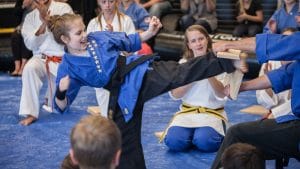Parents of kids on the autistic spectrum often feel at a loss. Will my child be able to learn, relate to, befriend other kids? What’s the best activity for them to develop social skills? Can my kid join a team? Can he or she lead one?
An increasing body of research shows that kids with autism benefit from physical activity in a variety of ways, from building coordination and physical strength to increasing self-confidence and the ability to relate to parents, teachers, and their peers.
Kids with autism experience a set of struggles beyond what the average person can imagine. These challenges range from difficulty interacting socially to developing fundamental motor skills like running, throwing and catching.
Obviously, karate is a hugely physical activity. And because effective karate training, even before the Covid era, doesn’t require full contact, it’s an activity that’s suited for kids as young as 3 years old. Learning traditional taekwondo forms like Chon Ji requires kids to coordinate their limbs, hit specific stances, use footwork to transition between positions, and develop strength to throw the blocks and punches with force and power.
For kids on the autism spectrum, martial arts serves as an ideal form of exercise, allowing kids to concentrate on their movements and respond to feedback from instructors. Once the physical motions are mastered, kids can show off their progress for karate instructors, parents, or their peers (or even an entire class). This reinforces the social skills aspect of karate training and gives autistic kids a safe environment to develop and display their newfound skills.
This isn’t just speculation or wishful thinking.
Dr. Greg Moody is an 8th-degree black belt and head instructor of Karate Built Martial Arts Academy in Cave Creek, Arizona. He also holds a PhD in Education, and his dissertation was based on research into how martial arts—specifically, black belt training—impacts kids with autism. Master Moody’s son was diagnosed with autism at age 3. When he began to train at the karate academy, he had trouble interacting and even speaking the student creeds aloud. Years later, he’s become a karate instructor, a leader on his high school’s football track and field teams, and a student at the top of his academic class. Master Moody credits karate with much of his son’s success.
If you’re looking for an activity to engage autism and develop the kinds of skills that autistic kids (and their parents) strive lo learn, karate’s a great place to start.



